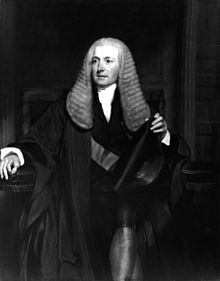Charles Manners-Sutton, 1st Viscount Canterbury

Charles Manners-Sutton, 1st Viscount Canterbury PC (born January 9, 1780 in Screveton ( Nottinghamshire ), † July 21, 1845 in London ) was a British politician of the Tories and Speaker of the House of Commons .
Family and career
Manners-Sutton came from an influential political and clerical family. His great-grandfather John Manners, 3rd Duke of Rutland , was among other things Chancellor of the Duchy of Lancaster . His uncle Thomas Manners-Sutton, 1st Baron Manners , was among other things Lord Chancellor of Ireland . He himself was the son of the future Archbishop of Canterbury , Charles Manners-Sutton . His youngest son, John Manners-Sutton, 3rd Viscount Canterbury, was also a member of the House of Commons and Lieutenant - Governor of New Brunswick , Governor of Trinidad and Victoria for several years
After education at Eton College , he graduated in law at Trinity College of Cambridge University . After graduating, he in 1802 with a Bachelor of Arts (B.A.) and 1805 also the academic degree of Master of Arts (M. A.) graduated, place its admission to the lawyer ( Barrister ) at the Law Society of Lincoln's Inn , one of the four traditional bar associations ( Inns of Court ) of England and Wales. He later became a senior member (bencher) of Lincoln's Inn.
In 1811 Manners-Sutton married Lucy Denison, with whom he had two sons and a daughter. After his wife died in 1815, he remarried in 1828. There was a daughter from this marriage with Ellen Power. Manners-Sutton died in 1845, his title passed to the eldest son Charles .
Political career
Deputy and chief military lawyer
Manners-Sutton began his political career in 1806 with the election to the House of Commons . There he represented the constituency of Scarborough as Tory until 1832 . After the electoral reform ( Reform Act 1832 ) he was a member of the electoral district of Cambridge University until 1835.
In 1809 he was appointed Chief Judge Advocate General by Prime Minister Spencer Perceval . On November 8, 1809 he was also appointed a member of the Privy Council . After Perceval was the only Prime Minister of Great Britain to be assassinated on May 11, 1812 , Sutton-Manners retained the post of Chief Military Lawyer until 1817 under his successor Robert Banks Jenkinson, 2nd Earl of Liverpool .
Speaker of Parliament and member of the House of Lords
On June 2, 1817 he was then as the successor to Charles Abbot spokesman ( Speaker ) of the House of Commons. During the political crisis at the time of the electoral reform of 1832, he was occasionally mentioned as a possible candidate for the office of Prime Minister. Following the Whigs' election victory in the House of Commons elections of 1834, he was not reelected Speaker of the House after seventeen years in office in December 1834. He was succeeded on February 19, 1835 James Abercromby .
However, he turned down the position of British High Commissioner in Canada , which he had been offered instead .
After leaving the House of Commons, he was raised to hereditary nobility in 1835 . He held the title of Viscount Canterbury , of the City of Canterbury , and as such belonged to the House of Lords .
Awards
In 1824 his alma mater , Trinity College, awarded him an honorary doctorate in law ( LL. D. ). On August 31, 1833 he was appointed Knight Grand Cross of the Order of the Bath (GCB).
literature
- Canterbury, Charles Manners-Sutton, 1st Viscount . In: Encyclopædia Britannica . 11th edition. tape 5 : Calhoun - Chatelaine . London 1910, p. 209 (English, full text [ Wikisource ]).
Web links
- Charles Manners-Sutton, 1st Viscount Canterbury on thepeerage.com , accessed September 11, 2016.
| predecessor | Office | successor |
|---|---|---|
| New title created |
Viscount Canterbury 1835-1845 |
Charles John Manners-Sutton |
| personal data | |
|---|---|
| SURNAME | Manners-Sutton, Charles, 1st Viscount Canterbury |
| ALTERNATIVE NAMES | Manners-Sutton, Charles; Canterbury, Charles Manners-Sutton 1st Viscount |
| BRIEF DESCRIPTION | British politician (Tory) and Speaker of the House of Commons |
| DATE OF BIRTH | January 9, 1780 |
| PLACE OF BIRTH | Screveton ( Nottinghamshire ) |
| DATE OF DEATH | July 21, 1845 |
| Place of death | London |